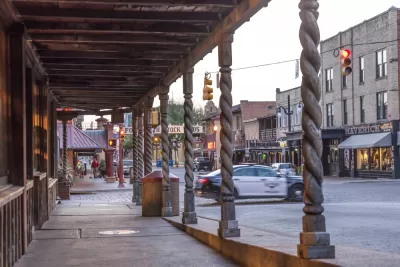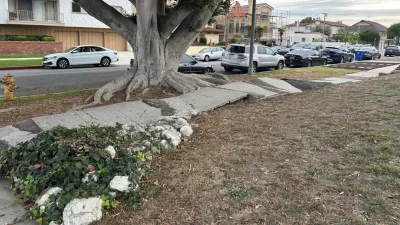A proposal in the city council could shift the burden of sidewalk repairs away from property owners, who are currently responsible for 100 percent of expenses.

After noticing the disparate states of sidewalks in different parts of her own neighborhood, Fort Worth journalist Emily Wolf examines the city’s sidewalk paving policy to find out why some sidewalks in the city are more well-maintained than others.
As it turns out, “Fort Worth has required private homeowners to maintain sidewalks since the 1960s, but stopped enforcing the penalties included in that ordinance several decades ago. What’s resulted is a patchwork of sidewalks in various states of disrepair across the city, with little recourse for owners with lower incomes or disabilities.” The issue is particularly evident in front of rental properties, Wolf notes. “Sidewalks in front of rentals, in particular, were often littered with large fractures and divots, the rentals’ owners far away from the realities of the area.”
Whether coincidentally or not, months after Wolf published a piece about the city’s inconsistent sidewalk policy and the challenges it poses for residents with disabilities, among others, “city staff presented a proposal to city council to establish a cost-sharing program similar to Dallas. Under the proposal, the city would use a portion of the fiscal year 2023 PayGo funding, totaling $2.6 million, to develop the program.” The program would have the city pay for 50 percent of the cost of repairs, “with a particular emphasis on low-income homes, seniors and disabled residents.”
FULL STORY: Walking the walk: government reporter explores the reasons for Fort Worth’s crumbling sidewalks

Planetizen Federal Action Tracker
A weekly monitor of how Trump’s orders and actions are impacting planners and planning in America.

San Francisco's School District Spent $105M To Build Affordable Housing for Teachers — And That's Just the Beginning
SFUSD joins a growing list of school districts using their land holdings to address housing affordability challenges faced by their own employees.

The Tiny, Adorable $7,000 Car Turning Japan Onto EVs
The single seat Mibot charges from a regular plug as quickly as an iPad, and is about half the price of an average EV.

San Diego Votes to Rein in “Towering” ADUs
City council voted to limit the number of units in accessory buildings to six — after confronting backyard developments of up to 100 units behind a single family home.

Texas Legislature’s Surprising Pro-Housing Swing
Smaller homes on smaller lots, office to apartment conversions, and 40% less say for NIMBYs, vote state lawmakers.

Even Edmonton Wants Single Staircase Buildings
Canada's second most affordable major city joins those angling to nix the requirement for two staircases in multi-family buildings.
Urban Design for Planners 1: Software Tools
This six-course series explores essential urban design concepts using open source software and equips planners with the tools they need to participate fully in the urban design process.
Planning for Universal Design
Learn the tools for implementing Universal Design in planning regulations.
Smith Gee Studio
City of Charlotte
City of Camden Redevelopment Agency
City of Astoria
Transportation Research & Education Center (TREC) at Portland State University
City of Camden Redevelopment Agency
Municipality of Princeton (NJ)





























